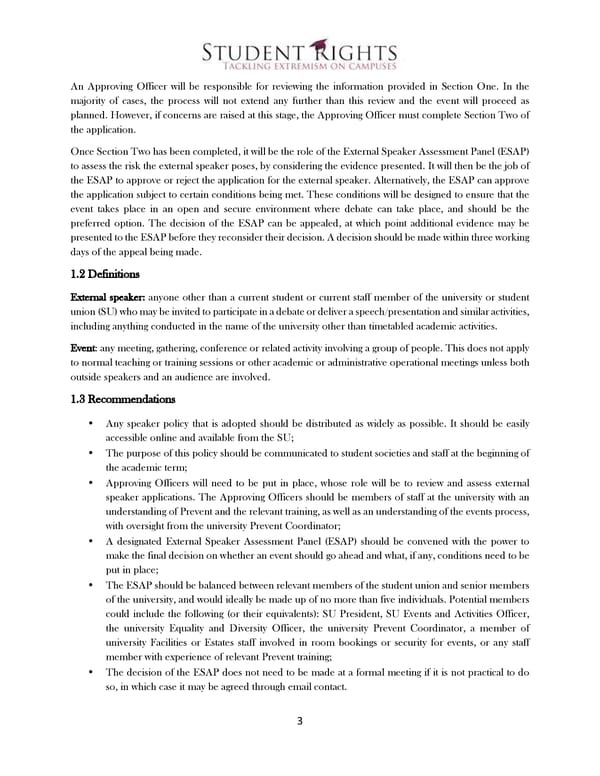! An Approving Officer will be responsible for reviewing the information provided in Section One. In the majority of cases, the process will not extend any further than this review and the event will proceed as planned. However, if concerns are raised at this stage, the Approving Officer must complete Section Two of the application. Once Section Two has been completed, it will be the role of the External Speaker Assessment Panel (ESAP) to assess the risk the external speaker poses, by considering the evidence presented. It will then be the job of the ESAP to approve or reject the application for the external speaker. Alternatively, the ESAP can approve the application subject to certain conditions being met. These conditions will be designed to ensure that the event takes place in an open and secure environment where debate can take place, and should be the preferred option. The decision of the ESAP can be appealed, at which point additional evidence may be presented to the ESAP before they reconsider their decision. A decision should be made within three working days of the appeal being made. 1.2 Definitions External speaker: anyone other than a current student or current staff member of the university or student union (SU) who may be invited to participate in a debate or deliver a speech/presentation and similar activities, including anything conducted in the name of the university other than timetabled academic activities. Event : any meeting, gathering, conference or related activity involving a group of people. This does not apply to normal teaching or training sessions or other academic or administrative operational meetings unless both outside speakers and an audience are involved. 1.3 Recommendations •! Any speaker policy that is adopted should be distributed as widely as possible. It should be easily accessible online and available from the SU; •! The purpose of this policy should be communicated to student societies and staff at the beginning of the academic term; •! Approving Officers will need to be put in place, whose role will be to review and assess external speaker applications. The Approving Officers should be members of staff at the university with an understanding of Prevent and the relevant training, as well as an understanding of the events process, with oversight from the university Prevent Coordinator; •! A designated External Speaker Assessment Panel (ESAP) should be convened with the power to make the final decision on whether an event should go ahead and what, if any, conditions need to be put in place; •! The ESAP should be balanced between relevant members of the student union and senior members of the university, and would ideally be made up of no more than five individuals. Potential members could include the following (or their equivalents): SU President, SU Events and Activities Officer, the university Equality and Diversity Officer, the university Prevent Coordinator, a member of university Facilities or Estates staff involved in room bookings or security for events, or any staff member with experience of relevant Prevent training; •! The decision of the ESAP does not need to be made at a formal meeting if it is not practical to do so, in which case it may be agreed through email contact. 3! !
 A Model External Speaker Policy Page 4 Page 6
A Model External Speaker Policy Page 4 Page 6